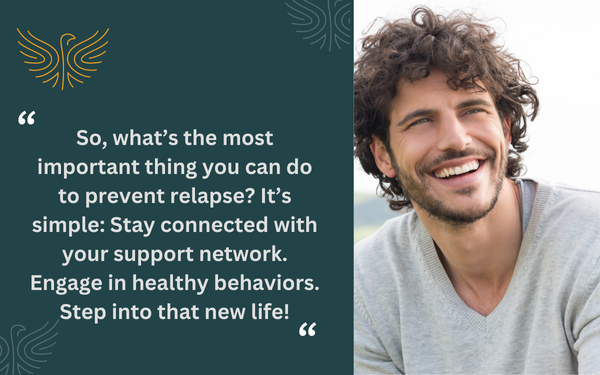For many, relapse is a natural part of recovery. However, once you complete rehab, it’s in your best interest to do everything within your power to avoid and manage your triggers, ultimately, preventing relapse. This ensures you stay on track toward sustainable recovery and a healthier and happier life.
In this article, we provide practical, proven strategies to help you stay on track—whether it’s building a strong support system, creating healthy routines, or knowing what to do when cravings hit. With the right tools and mindset, long-term recovery is absolutely within reach.
_______________________________________________________
What Is the Most Important Thing I Can Do to Help Prevent Relapse?
The worst thing you can do after rehab is isolate yourself or re-engage with past behaviors and habits. So, what’s the most important thing you can do to prevent relapse? It’s simple: Stay connected with your support network. Engage in healthy behaviors. Step into that new life!

This means ensuring you’re in contact with the people who support you and help you maintain healthy routines. When needed, lean on your support system, whether that’s close friends, family, a therapist, or a recovery group. Don’t wait for things to get bad to reach out—regular check-ins, even when you’re doing well, can help you stay on track.
And don’t underestimate the power of routine. Having structure in your day—like going for a walk, going to the gym, cooking a healthy meal, or showing up to a meeting—can keep your mind focused and give you a sense of purpose.
When it comes down to it, recovery is about showing up for yourself every day, even when it’s hard. And staying connected is one of the best ways to do that.
_______________________________________________________
What To Do If You Relapse
First, it’s okay to feel disappointed or frustrated. But it doesn’t mean you’ve failed, and it definitely doesn’t mean all your progress is gone. Recovery is a journey, and like any journey, it comes with twists, turns, and a few bumps in the road.
.png)
Instead of letting guilt or shame take over, try to look at relapse as information. Use it as a sign that something in your recovery plan might need a little attention or adjustment. Maybe a trigger caught you off guard, a coping tool didn’t work the way it used to, or maybe life just hit a little harder than expected. Whatever the case, there’s something to learn from it—and learning is a big part of moving forward.
What To Do Immediately After
Those initial moments right after a relapse can feel overwhelming and disheartening, but this is when your choices matter most. Here’s what to do right away:
- Pause and breathe. Take a moment to ground yourself. You’re not starting from scratch—you’re just recalibrating.
- Reach out for support. Call someone you trust, such as a friend, family member, sponsor, therapist, or recovery coach.
- Avoid further use. Try not to let one slip turn into a full return to substance use. The sooner you stop, the easier it is to get back on track.
- Reflect without judgment. Ask yourself what led up to the relapse. Was it stress? Isolation? A specific event or trigger? Use this moment to gather insight and redirect.
- Recommit to your recovery. This might mean returning to meetings, seeing a counselor, or adjusting your daily routine.
- Practice self-compassion and kindness. Talk to yourself the way you would talk to a loved one who’s struggling. No one is perfect, but it is up to you what happens next.
Treatment Options
You’re not alone, and one moment doesn’t define you. As stated above, a relapse signifies that it’s time to reassess things and potentially revisit support. While you’re not back at square one, you may need some additional help (and that’s okay!).
Depending on the severity of your relapse, you may want to consider re-entering treatment for a brief time, such as:
- Returning to Outpatient Care: If you’ve kept up with some of your healthy routines and just need a little extra guidance, a short outpatient program or a support group might be enough to help you course-correct. Sometimes a regular check-in is all it takes to feel back on track.
- Rejoining an IOP or PHP: If things have felt a little heavier or like you’ve lost your footing, a more structured setting like an Intensive Outpatient Program (IOP) or Partial Hospitalization Program (PHP) can offer the added support and stability you might need right now.
- Inpatient Rehab: For more severe situations and to prevent escalation, it may be best to re-admit yourself to a rehab center. This way, you can ensure you’re in a safe environment to regroup and recommit.
- Mental Health Support: Working with a therapist can help you unpack what’s going on underneath and continue to build healthier coping strategies to support your recovery. They can also help address any recurring mental health issues and reinforce healthy coping mechanisms.
No matter whether it’s your first or last time in rehab, Freedom Recovery Centers (FRC) is here to help you reclaim your life. If you’re struggling, know it takes courage and bravery to get the help you need. There’s no shame or judgment, and you don’t need to do this alone. Call us today at 804-635-3746, and we’ll be there by your side as you recommit to your recovery and reset.
.svg)






.svg)

.svg)



.svg)
